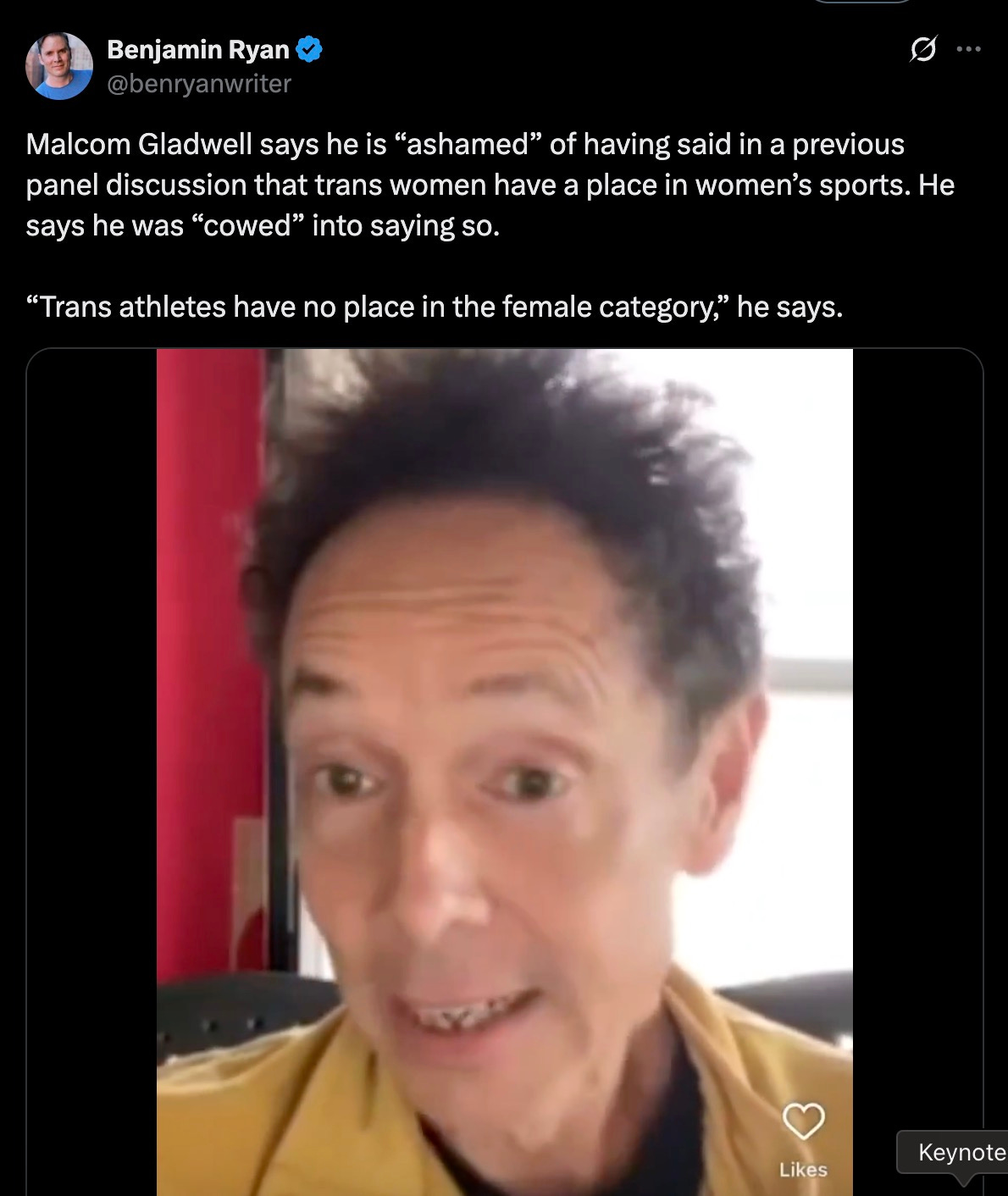Why the Trans Tide is Turning
Are you paying attention, church?
A shocking video clip made the rounds this week featuring bestselling author and podcaster Malcolm Gladwell. In the video, Gladwell referenced a panel discussion he participated in about "trans women” (a.k.a. delusional men) participating in women’s sports.
(Click the image if you want to watch the short clip.)
He acknowledges that the entire panel was in favor of the “trans women,” and he felt “cowed” into endorsing that idea. But now, he admits, he and the rest of the panel would go the opposite direction.
Gladwell did not change his mind because he pulled up the argumentation for both sides and realized some new facts had come to light. The information has not changed, and the conclusion is as obvious today as it always has been. But until recently, Gladwell and his cohorts refused to entertain it. Why?
Because now it’s safe to say what was always obviously true.
Further, up until 2017 or so, Gladwell and his cohorts didn’t even think about endorsing a man dressing up like a woman and playing women’s sports. Then, from 2017-early 2025, they suddenly decided it was obviously a necessary step for society. Now, they’re back. What happened?
Again, it was not argumentation that won them over and won them back. Most people—even “public intellectuals”—don’t operate that way. The trans folks badly overplayed their hand, the GOP won the election, athletes and other cultural icons started emphasizing the importance of family, and suddenly, the spell of transgenderism’s dominance was ended. In other words, culture and power win these battles, not facts and figures.
This is really really really important, so pay attention to what’s happening here:
Most people’s minds aren’t changed by good argumentation. Their minds are changed by cultural pressure.
Church, we HAVE to understand that just winning arguments will never be enough. We have to go, build, and do, or we will be relegated to patting ourselves on our back for our rightness in decaying buildings with shrinking attendance.
2 years ago I wrote a brief article entitled The Unexpected Way Minds Are Changed, but it was exclusive to premium subscribers and many readers have joined since that time, so most here likely haven’t read it.
I’m updating and resharing it today because it explains the exact phenomenon at play in the Gladwell case. And, it highlights ways we can leverage this reality into building stronger churches.
The Unexpected Way Minds Are Changed
If conservative commentator Ben Shapiro has a catchphrase, it’s “Facts don’t care about your feelings.”
In a sense he’s right—how you and I feel about the truth doesn’t change it’s truthfulness.
But the approach that flows from this truth woefully misunderstands human nature.
Shapiro has made a name for himself as a debater, with viral videos of him “DESTROYING” liberal logic displaying his acumen for tearing apart talking points.
Because of this, he and many other conservatives believe such debate is one of the best weapons to combat our cultural problems. Good arguments will win in the end, right?
This is giving people way too much credit.
It is focusing entirely on the head as the locus of a person’s decision-making, ignoring the heart completely. This is why, no matter how many times Shapiro and co. dismantle somebody’s faulty logic, it rarely results in the person conceding and changing sides.
Jonathan Haidt explained this best with his elephant analogy (of which you can watch a longer breakdown here).
Essentially, the human is like the union of an elephant and a man riding atop the elephant. The man might think he’s in control with some kind of reins, but if the elephant decides it’s going somewhere, then that’s where they’re going. And, at that point the rider will convince himself that that’s where he wanted to go, too—that it was his idea.
In other words, the heart subconsciously drives most of our decision-making, and the head consciously finds a defensible explanation for the decisions the heart already made.
This is why “DESTROYING” arguments and creating cognitive dissonance in people rarely causes change.
If they don’t want to change, and if they feel the social or emotional cost of change would be too high, then most people will not change. Trying to drive change through argumentation is like yelling at the rider to make his stubbornly eastbound elephant turn west.
There are a number of important applications to this, such as a discussion of why the Bible warns us against trusting our hearts (Jeremiah 17:9), and why we must build self-awareness and a community who will help us see our blind spots driven by what we desire to believe.
But the point I want to make here builds on my Individualism is a Lie article about how we are heavily influenced by culture whether we realize it or not. As tribally minded people, much of what motivates the elephant is a desire to fit in with the group. So our subconscious, the elephant, is often not asking “what is correct?” but rather “What do people want me to believe?”
You might think this is too cynical a view of people’s reasoning skills.
If you’re the kind of person who reads 2,000 word Substack articles on Christianity and theory of mind, there’s a decent chance you’re pretty good at independent, critical thinking, and so you might assume everybody else is, too.
But we all know we’re subtly influenced by subconscious factors all the time. And if 2020 taught us anything it’s that the majority of people simply do not want to think for themselves when the stakes are high. They want to fit in and be reassured they’re on the right side. They then convince themselves they got there on their own.
I used to get frustrated with this dynamic and spent a lot of time trying to figure out how to get people to pay attention and think critically. But that’s not how God made mankind. We can be idealistic about this, or we can engage the world as it actually is.
And viewing the world realistically, some people just aren’t wired that way. That’s why competent, decisive leadership is so key to all of this—people need to be shepherded.
As I’ve said before, we need to stop using “sheep” as an insult and start reckoning with it as a reality.
In order to set right a church that is adrift in many ways, we have to take all of this into account and apply it. It is not enough to tell people what is right and what is wrong.
A few things we can do:
Build culture. Whether evangelistically or internally, the people we seek to influence need to be given a desire to accept the change they see. For example, if the preacher’s wife is the pants-wearing breadwinner, or the elders wives not-so-secretly run the church, that will do more to influence the church’s culture than a year of sermons on Ephesians 5.
On the other hand, virtuous, decisive husbands, leading chaste, submissive wives, raising well-trained, respectful children in joyful homes all make up a winning argument unto itself.Pray for, raise up, support, and follow leaders. These are the culture setters. People are looking for some kind of authority to validate their decisions, and they know it when they see it. This undercurrent runs heavily through Timothy and Titus, and it’s why the lists of elder qualifications look the way they do.
We can’t do this overnight, but we can start down that road today. And we can make a difference by being the best sheep possible to those who are over us.Continue to speak Scriptural truths. Though it’s not enough on its own, it’s still absolutely essential. The heart is pricked by the Spirit when the Word is spoken, and the head needs something solid to ground it. Aim for the elephant, then show the rider why the elephant’s choice was good and right.
As I’ve said before, there are no shortcuts. Winning debates is fun (and often easy) and doesn’t take long, but we’ve been winning debates longer than any of today’s church has been alive.
True change is going to take a different kind of tactic that starts with the realities of human nature, realities we would have realized all along if we had done things God’s way.
Notes
Subscribing is FREE, but if you’d like to support my work and get 4 eBooks as a token of my thanks, you can do so here!




"aim for the elephant" Outstanding.
They aren't "trans." They are "transvestites."